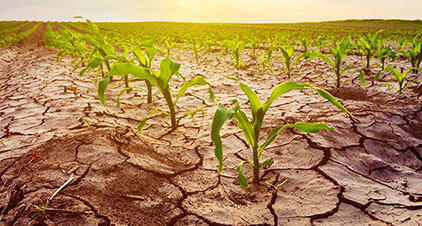Large-scale research project launched aimed at empowering and positioning African farmers and agribusinesses to adapt to climate change
Africa is at the forefront of climate change impact. These changes adversely affect production and sourcing of agricultural commodities, such as grains, cotton and vegetables. Soil health management and quality input product are means to combat these effects. The real obstacle lies in the starting point of these combatants. For this reason, Wageningen University & Research and The Dutch Development Bank FMO, Heineken International, the African Cotton Foundation (ACF) and Export Trading Group (ETG) aim to determine in a new aspiring research project: Climate resilient agri sourcing in Africa.
A multi-disciplinary team of WUR scientists consisting of economic, climate and plant researchers are joining forces to map climate risks for prioritisation, execute deep dives on high risk agri production areas and its drivers, and define feasible technical and economic improvement options for climate mitigation and adaptation for farmers and agri product buyers.
The WUR research team will develop a scalable approach for climate resilient agri sourcing to benefit farmers and consumers.
Goal
The goal is to generate insight into the physical impact of climate change in 20 countries and 15 agri products across the continent and to identify feasible and viable improvement options for climate mitigation and adaptation.
Pieternel Boogaard, Global Head Agribusiness, Food & Water at FMO: "Climate change is already impacting African farmers and agribusinesses along the supply chain. We urgently need to accelerate mitigation and adaptation efforts and help build resilience to worsening climate impacts that are coming. FMO supports this initiative by the WUR research team because we are convinced that scalable insights of climate impact and improvement options for many agri products and regions will help to understand changes in risk profiles. This is a perfect combination where we bring value to our clients through smart partnerships in our focus area of Climate Smart Agriculture. I am very much looking forward to the first results, and our cooperation with the WUR research team, Heineken International, ACF and our customer ETG for the coming years."
Satellite and ground data
The researchers will take an innovative approach by linking different levels and disciplines at Wageningen University and Research to efficiently use information from satellites. Available data of agri production areas and plant growth will be compiled. Researchers will apply crop growth modelling, extrapolation and prediction of shifts in production regions, including the level of crop productivity under different climate change scenarios, such as chill hours, length of wet seasons, pest pressures, and heat that affects the suitability of production regions. The envisaged climate risk assessment framework is a generic and stepwise approach to climate-proof agriculture and sourcing, leading to advanced climate proof decision making.
Willem Ruster, Programme Manager Sustainability Management in Agri & Food of Wageningen Economic research: "We will develop a scalable tool and process that will substantially increase the speed of generating climate risk profiles, priority areas and adaptation options. We all know that we have to adapt, and that agri value chains will be largely affected but we lack the overview of what will happen and how to act."
Aiming for solutions at a large scale
Earlier research highlighted already best practices for adaptation in agriculture. Farmers could improve soil health management, or local governments could increase the access to better seeds. Weather data infrastructure can assist farmers to better prepare for periods of heavy rainfall, with improved irrigation methods to adapt to longer periods of drought.
Crop breeding, field management, precision agriculture and changes in transport, logistics, early warning systems, financial mechanism such as insurance to field and water management collectively forms part of the solution. This new research is meant and set up to help agri off-takers to invest in climate adaptation to secure long-term supply and at the same time help farm communities to become more climate resilient and take the measures needed to protect and improve their livelihoods.
Most problematic areas first
The research will run from 2021 up to 2025 and will apply a funnel approach. The first year will focus on scanning climate risks in 20 countries and 15 agri products and prioritise the highest risk areas. The consequent years, researchers will focus on the most problematic areas and prioritise feasible adaptation options. They will combine crop knowledge with local regional knowledge over landscape, production systems, soil and trends in local weather conditions.
The growing areas with the highest risk are shortlisted based on their sensitivity to climate change, for example increasing periods of drought, heat and intense rainfalls or even pest pressure. Based on data, the researchers will develop ways to address these problems, starting with the most affected crops.
Local parties will also be involved. Willem Ruster: "The local farmers are a central part of the solutions, which have sometimes been present all along. We are keen to short-list solutions that align with the incentives of both the farmer and the buyers, and involve local governments, who also are a key partner in terms of information, experience and developing solutions at scale."



